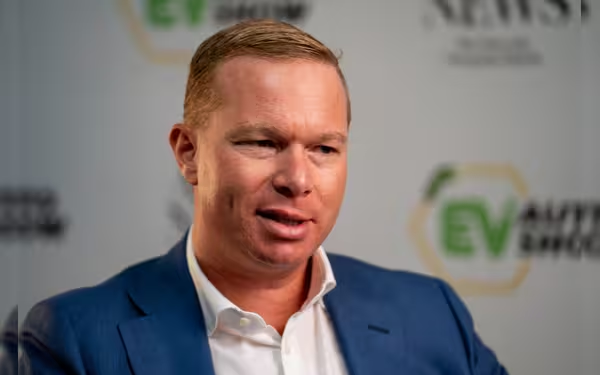Saturday, November 16, 2024 05:41 PM
Saudi Arabia's PIF Invests $39 Billion in E-Mobility Revolution
- PIF to invest $39 billion in electric vehicle ecosystem.
- Saudi Arabia aims for a sustainable transportation future.
- 40% of Saudis interested in electric vehicles by 2026.
 Image Credits: arabnewspk
Image Credits: arabnewspkSaudi Arabia's PIF plans a $39 billion investment to revolutionize the e-mobility sector, aiming for a sustainable transportation future.
Saudi Arabia is making significant strides in the e-mobility sector, with its sovereign wealth fund, the Public Investment Fund (PIF), planning to invest a staggering $39 billion. This ambitious investment aims to create a robust electric vehicle (EV) ecosystem in the Kingdom, marking a pivotal shift towards sustainable transportation.
According to Heiko Seitz, a partner and global e-mobility leader at PwC, the PIF's investment strategy is designed to establish a comprehensive value chain for electric vehicles. Seitz explained that approximately half of the total investment will be directed towards developing an EV manufacturing ecosystem, while one quarter will focus on battery manufacturing and supply chains, and the remaining quarter will be allocated to parts and chips. This strategic approach is expected to lay the groundwork for a new industry in Saudi Arabia.
Seitz emphasized the national effort to build this industry from the ground up, noting the impressive speed at which Saudi Arabia is partnering with leading global companies. He remarked, "It is quite spectacular and fascinating to see how a country is able, in such a short time, to partner up with leading companies globally, and bring the best of the world to the Kingdom." This collaboration is set to kickstart a successful journey in the e-mobility sector.
However, the transition to electric mobility is not without its challenges. Seitz pointed out that the availability of new electric vehicles and the lack of charging infrastructure are significant hurdles. Currently, only about 7 percent of cars sold in the Middle East are battery electric, compared to approximately 30 percent in Europe. This disparity limits consumer choices in the region.
Fortunately, efforts are underway to address these challenges. Companies like Electric Vehicle Infrastructure Co. (EVIQ) are actively working to expand charging stations across Saudi Arabia. In a notable development, EV maker Lucid, which is backed by the PIF, has signed a memorandum of understanding with EVIQ to enhance high-speed public charging infrastructure in the Kingdom. Seitz expressed optimism about the future of electric mobility in the region, stating, "I’m quite optimistic that we’re going to have a very bright future for electric mobility in the region."
As the costs of electric vehicles continue to decline globally, they are becoming increasingly affordable. Seitz noted that for commercial fleet operators in Saudi Arabia, driving an EV is nearly as cost-effective as operating a traditional combustion engine vehicle. However, individual customers may still find EVs slightly more expensive due to better discounts available to fleet customers. Nevertheless, with more car brands entering the Saudi market, a price war is anticipated, similar to what has occurred in Europe, which could lead to further reductions in EV prices.
A recent survey conducted by PwC revealed that 40 percent of the Saudi population is interested in purchasing an electric vehicle within the next three to four years. With the introduction of more models and local brands like Lucid and Seer, the momentum towards an all-electric future appears unstoppable. Seitz commended Saudi Arabia's commitment to promoting green technologies in mobility, despite its status as an oil-rich nation. He stated, "Twenty-four percent of global carbon dioxide emissions come from the transport sector. So if we’re serious about making our future greener and cleaner, we have to decarbonize mobility now."
Looking ahead, Seitz praised Saudi Arabia's "fabulous, green electricity agenda," predicting that by 2035, the Kingdom's entire mobility energy demand will be fully powered by green energy, primarily solar power. This vision illustrates that electrification and decarbonization can coexist even in an oil-rich country. As Saudi Arabia embarks on this transformative journey, it sets a compelling example for other nations, demonstrating that a sustainable future is not only possible but also achievable.













